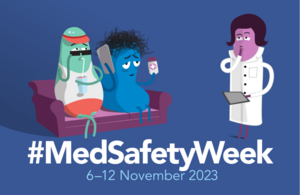Suspect you have experienced a side effect or incident from a healthcare product? Submit a Yellow Card report to improve safety for everyone
Whether you’re a patient, healthcare professional or carer, this year’s #MedSafetyWeek campaign is calling on you to help improve the safety of medical products by reporting any suspected side effects and adverse incidents to the MHRA Yellow Card scheme.

The eighth annual #MedSafetyWeek campaign has today (6 November 2023) been launched by the Medicines and Healthcare products Regulatory Agency (MHRA). Part of a global campaign involving 88 countries, the initiative runs from 6-12 November and aims to improve patient safety by encouraging reporting of any suspected side effects from medicines and adverse incidents associated with medical devices.
With this year’s theme being ‘Who can report?’, the campaign focuses on the key role that every patient, carer and healthcare professional has in reporting suspected side effects and adverse incidents with medical devices, and the positive impact this can have on patient safety. You don’t have to prove that the healthcare product caused the side effect or incident - just a suspicion is enough for you to submit a report.
This year’s campaign consists of an international collaboration involving 100 organisations spanning across 88 countries that operate their own national patient safety monitoring systems like the MHRA Yellow Card scheme. The purpose of safety monitoring is to gain information about new side effects and adverse incidents, to find out more about known ones, and, most importantly, to ensure the safest use of medicines and medical devices.
All healthcare products carry a risk of causing adverse reactions or incidents. The Yellow Card scheme is one of several robust measures used by the MHRA to continuously monitor the safety of medicines and medical devices once in clinical use to ensure their benefits continue to outweigh any risks. All healthcare product regulators operate systems to detect and analyse adverse reactions and incidents.
It is important that everyone submits a report to the Yellow Card scheme as soon as they suspect a side effect from a medicine or adverse incident associated with a medical device. This ensures that actions to reduce harm are based on the best available evidence and can improve safety for as many people as possible.
Dr Alison Cave, MHRA Chief Safety Officer, said:
“Every report made to the MHRA Yellow Card scheme counts. Yellow Card reports are vital in building more knowledge and understanding about the potential risks of medicines and medical devices in clinical use and allows action to be taken to minimise harm to patients.
“Reporting helps to make medicines and medical devices safer for all patients. In doing so, you are helping those who are most vulnerable and at risk of potential harm.
“If you or someone in your care experiences a suspected side effect or adverse incident relating to a medicine or medical device, it is essential that you report it to us promptly. The faster you report, the quicker we can take action to prevent others from experiencing serious and occasionally life-threatening issues.”
Anyone can report suspected issues with any healthcare product to the Yellow Card scheme. Reports can be submitted in several ways:
- Online at www.mhra.gov.uk/yellowcard
- Via the free Yellow Card app (available for Android and Apple devices)
- Healthcare professionals and providers can also use clinical systems to make a report, such as MiDatabank, SystmOne, EMIS or VISION.
Notes to Editors
- National medicines regulators from 88 countries across the globe and their stakeholders will be taking part in this international campaign led by Uppsala Monitoring Centre (UMC) - the World Health Organisation (WHO) Collaborating Centre for International Drug Monitoring. The campaign is supported by the International Coalition of Medicines Regulatory Authorities (ICMRA). For more information on the campaign and how you can get involved, as well as free social media assets, visit the global campaign website and the Yellow Card scheme website.
- The Medicines and Healthcare products Regulatory Agency (MHRA) regulates medicines, medical devices and blood components for transfusion in the UK. MHRA is an executive agency, sponsored by the Department of Health and Social Care.
- The Yellow Card scheme enables the MHRA to monitor safety concerns such as suspected side effects or adverse incidents involving healthcare products. These include medicines, vaccines, blood factors and immunoglobulin products, medical devices, e-cigarettes and complementary therapies such as homeopathies. The scheme also collates information about suspected safety concerns involving defective, falsified or fake healthcare products. Every report helps the MHRA identify and response to safety issues to minimise the risk of harm. Since its establishment in 1964 the scheme has identified numerous safety issues to the benefit of many, thanks to individual reports from the UK public and healthcare professionals.
- Patients using the Yellow Card website should type the relevant medicine, vaccine, or medical device into the search bar and select ‘Start report’ on the right-hand side of the bar. The search bar also offers a drop-down menu to report for medicines, vaccines, medical devices, blood factors and immunoglobulin products, E-cigarettes, and herbal or homeopathic medicines that are not on the MHRA’s list, as well as the option to send additional details of the suspected material(s) if the product type is unknown, so that the final report is accurate.
- For adverse incidents associated with a medical device, healthcare professionals should report through the Yellow Card scheme or their local clinical reporting systems. Healthcare professionals in Northern Ireland and Scotland will need to report adverse incidents involving medical devices through the Northern Ireland Adverse Incident Centre (NIAIC) or National Services Scotland. For more information, please refer to our Yellow Card reporting guidance page.
- Patients are advised to contact a healthcare professional if they are worried about their health or the safety of any healthcare product they are receiving.